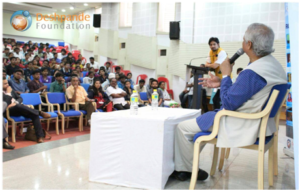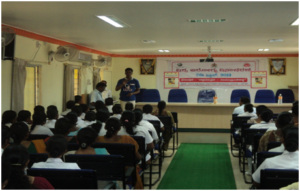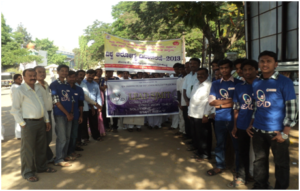Lead SJMIT cell was established in the year 2011 with an MOU between SJMIT and Deshpande foundation Hubli. Deshpande Foundation is a non-governmental organization started in 1996 in US by Dr. Gururaj (Desh) and Jaishree Deshpande to accelerate the creation of sustainable and scalable enterprises that have significant social and economic impact. Foundation has embarked on large-scale projects in the United States and India such as:
- Entrepreneurship for All.
- The Hubli Sandbox in Hubli, Karnataka, India.
- The Deshpande Center for Social Entrepreneurship in Hubli, Karnataka.
- The MIT Deshpande Center for Technological Innovation in Boston, Massachusetts.
- The Indus Entrepreneurs (TiE), in both the US and across India.
- The Indo US Collaboration for Engineering Education (IUCEE).
The foundation runs numerous programs in its Indian wing. Few of them are listed below.
- LEAD – LEADer’s Accelerating Development Program. – Offers students an opportunity to make a change in their world. Program works with students who have big ideas for a better India, and wants them to see that vision transform into reality.
- Deshpande Fellowship Program.
- Deshpande Education trust – nurtures innovative ideas and inspires entrepreneurial acumen in youth.
- Master of Social Entrepreneurship – a two-year residential program affiliated with Karnataka University Dharwad.
LEAD SJMIT
The Leaders Accelerating Development (LEAD) Program of SJMIT Chitradurga, Karnataka fosters innovative and entrepreneurial thinking within college students by exposing them to social issues and by encouraging them to volunteer their time and effort into the community. LEAD ignites their latent talent to come up with creative solutions and implement the same. LEAD is an incubator where innovation meets implementation, knowledge meets experience, social issues meet solutions and efforts meet impact.
LEAD SJMIT believes in shaping the youth’s personality to be a great human resource by building the LEADership qualities. This process involves several aspects, with numerous concepts to support the leadership growth and entrepreneurial ability among youths of the institute, LEAD organizes value addition programs and various events to mark its achievements.
Objectives of LEAD CELL SJMIT
- Team building, leadership, motivation, and mentor-ship.
- Talent development and career progression.
- Team organization and scheduling.
- Skills assessment and gap analysis.
- Team resource allocation and skills-based assignment.
- Collaboration and communication in a cooperative environment.
- Succession planning and individual development.
- Critical thinking and decision-making.
SJMIT LEAD TEAM
| Chairman | Principal, SJMIT, Chitradurga |
| Faculty co ordinator | |
| Regional coordinator and programme manager | Sri Krishnaji |
| Programme Assosiate | Sri Tanveer |
 |
 |
 |
 |





